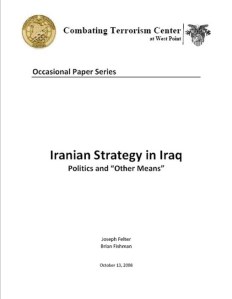Iranian Strategy in Iraq: Politics and “Other Means” assesses Iran’s strategy to project influence in Iraq and the means it uses to do so. This report addresses Iran’s dual-strategy of providing military aid to Iraqi militia groups while simultaneously giving political support to Iraqi political parties. Although the report details the scope and nature of Iranian support to Iraqi militias, it concludes that Iran’s political efforts are the core of its effort to project influence in Iraq. This report provides an overview of Iran’s multi-faceted efforts to pursue its national interests by influencing the political and security dynamics in Iraq from the Iranian Revolution to the present day. Although the report describes Iran’s direct and indirect lethal aid to surrogates in Iraq since the U.S. led invasion, it ultimately concludes that U.S. policy focuses on Iranian lethal aid to Iraqi militias at the expense of countering Iran’s primary mode of power projection in Iraq: support of Iranian-affiliated Iraqi political parties. The report also concludes that Iran has recently worked to reduce the level of violence in Iraq while concentrating on a political campaign to shape the SFA and SOFA agreements to its strategic ends.
Chapter 1 describes Iran’s covert operations in Iraq before the U.S.-led invasion in 2003, including the formation of the Iranian Revolutionary Guard Corps.
Chapter 2 assesses the trajectory of Iranian intervention in Iraq since 2003.
Chapters 3 and 4 describe Iranian lethal aid in Iraq and draw heavily on the interrogation summaries of detained militia members.
Chapter 5 provides key findings and recommendations.
 Skip to content
Skip to content

